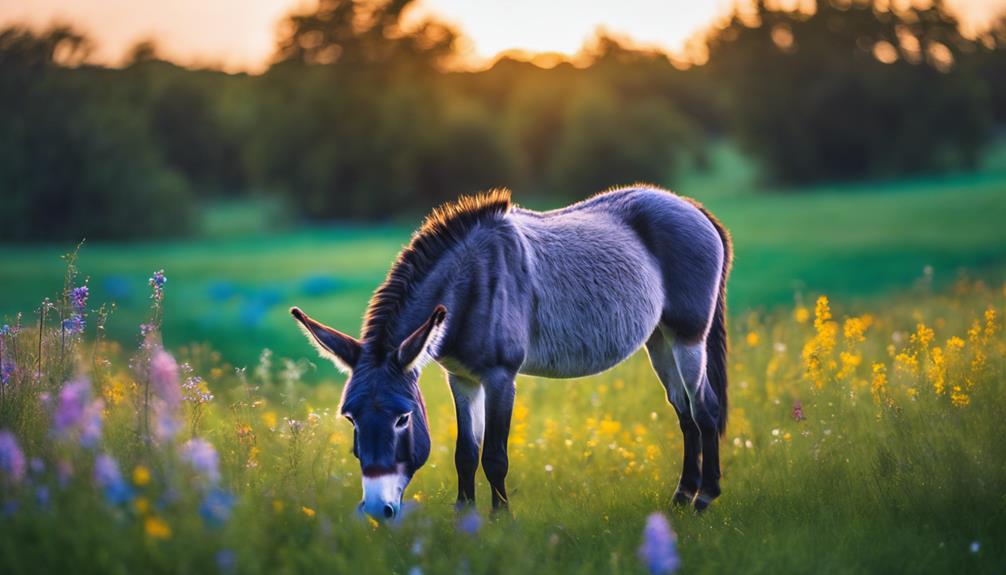Owning a donkey offers various benefits and challenges. On the positive side, donkeys are hardy animals that require minimal maintenance and provide strong companionship. They are cost-effective grazers, thriving in less-than-ideal foraging conditions and typically facing fewer health issues than other equines. Nevertheless, they require adequate space, a managed diet to prevent obesity, and consistent training due to their stubbornness. Regular healthcare is vital to prevent diseases and maintenance issues. Evaluating your living situation and financial commitment is essential for a fulfilling experience. Understanding these factors can greatly impact your decision, and further perspectives will clarify your path forward.
Main Points
- Donkeys are hardy animals that adapt well to various climates and require minimal shelter and care.
- They offer strong companionship and are known for their gentle and social nature.
- Owning a donkey can be cost-effective due to their ability to thrive on less-than-ideal grazing.
- Adequate space and shelter are crucial, as donkeys require room to roam and graze.
Benefits of Donkey Ownership
Owning a donkey offers numerous advantages, including their exceptional hardiness, low maintenance needs, and strong companionship qualities.
Donkeys are well-adapted to various climates and terrains, making them resilient animals that require minimal shelter and care. Their natural foraging behavior allows them to thrive on less-than-ideal grazing, which can be a cost-effective solution for owners.
In addition to their hardiness, donkeys provide a unique companionship that can be beneficial for individuals and families alike. Known for their gentle and social nature, donkeys often form strong bonds with humans and other animals, offering emotional support and enriching the lives of their owners. This companionship can be especially advantageous for children, as donkeys can teach responsibility and empathy.
Moreover, donkeys are often less prone to certain health issues compared to other equines, further reducing the financial burden of veterinary care. Their calm demeanor makes them suitable for various activities, from recreational riding to participating in therapeutic programs.
Altogether, the benefits of donkey ownership extend beyond practicality, offering a rewarding experience rooted in companionship and mutual understanding.
Challenges of Donkey Ownership
Despite their many benefits, donkey ownership comes with specific challenges that potential owners must carefully consider.
One primary challenge is the need for adequate space and shelter. Donkeys require ample room to roam and graze, as well as protection from harsh weather conditions. Inadequate housing can lead to health problems and stress.
Another important consideration is their dietary needs. Donkeys are prone to obesity and related health issues if not properly managed. Owners must provide a balanced diet, including high-fiber hay and limited grain, while being vigilant about their weight.
Training and socialization also pose hurdles. Donkeys are intelligent and can exhibit stubborn behavior if not trained consistently. They thrive in social settings, often requiring companionship from other donkeys or animals, which adds to the responsibility of ownership.
Healthcare is another crucial aspect. Regular veterinary care, vaccinations, and hoof maintenance are essential to guarantee their well-being. Additionally, donkeys can be susceptible to certain diseases and parasites, necessitating proactive health management.
Understanding these challenges is essential for anyone considering donkey ownership, making sure that they are adequately prepared to meet the needs of these unique animals.
Making the Right Decision
Weighing the various factors involved in donkey ownership is essential for potential owners to guarantee a fulfilling and responsible experience.
Prospective donkey owners should first evaluate their living situation. Donkeys require ample space, access to clean water, and appropriate shelter. The financial commitment should also be assessed, including costs for feed, veterinary care, and any necessary supplies.
Next, consider the donkey's temperament and social needs. Donkeys are social animals that thrive in companionship, either with other donkeys or compatible livestock. A solitary donkey may experience behavioral issues, so understanding the animal's social requirements is vital.
Additionally, prospective owners should reflect on their time availability. Donkeys require regular exercise, grooming, and interaction. Those with a busy lifestyle may find it challenging to meet these needs consistently.
Common Questions
How Much Space Does a Donkey Require for Comfortable Living?
Donkeys require a minimum of one acre per animal for comfortable living, allowing adequate space for grazing, exercise, and social interaction. Additional area is beneficial for their general well-being and to prevent behavioral issues.
What Do Donkeys Eat, and How Often Should They Be Fed?
Donkeys primarily consume hay or pasture grasses, supplemented with grains or commercial feeds as needed. They should be fed two to three times daily, ensuring access to fresh water and minerals for ideal health.
Are Donkeys Good Companions for Other Animals?
Donkeys can serve as excellent companions for other animals due to their gentle nature and social behavior. They often provide comfort and security to livestock, helping to reduce stress and foster a harmonious environment among the herd.
How Long Do Donkeys Typically Live?
Donkeys typically have a lifespan ranging from 25 to 30 years, although some may live beyond 40 years with proper care. Factors such as genetics, environment, and healthcare greatly influence their longevity and general well-being.
Can Donkeys Be Trained to Perform Specific Tasks or Tricks?
Yes, donkeys can be trained to perform specific tasks or tricks. Their intelligence and willingness to learn make them capable of following commands, participating in activities, and engaging in various forms of training, enhancing their utility and companionship.
Conclusion
In summary, owning a donkey presents both advantages and challenges that must be carefully considered.
The benefits include companionship, ecological contributions, and unique characteristics that improve agricultural practices.
Conversely, challenges such as space requirements, social needs, and potential health issues must not be overlooked.
A thorough assessment of one's circumstances and resources is essential before deciding to incorporate a donkey into a household or farm, ensuring that the well-being of both the animal and owner is prioritized.
